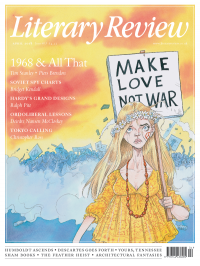Nicholas Rankin
Tuning Out
Auntie’s War: The BBC during the Second World War
By Edward Stourton
Doubleday 422pp £20
The endpapers of this book show two photos of Broadcasting House, seen from Portland Place. In the first, taken in 1932, the building resembles a sleek white liner; in the second, from 1945, the blackened building looks more like a battle cruiser after a hard run to Malta or Murmansk. The BBC played an integral part in the Second World War, unifying at home, beaconing hope abroad. It should be a great story to tell, but Edward Stourton’s attitude to the BBC is oddly conflicted.
Although he regularly presents programmes on Radio 4 (and read this book aloud on the network), Stourton is a member of the family who wishes to recoil from its embarrassing embrace. This explains his dreadful title, Auntie’s War, and the use of ‘Auntie’ as a nickname for the

Sign Up to our newsletter
Receive free articles, highlights from the archive, news, details of prizes, and much more.@Lit_Review
Follow Literary Review on Twitter
Twitter Feed
Alfred, Lord Tennyson is practically a byword for old-fashioned Victorian grandeur, rarely pictured without a cravat and a serious beard.
Seamus Perry tries to picture him as a younger man.
Seamus Perry - Before the Beard
Seamus Perry: Before the Beard - The Boundless Deep: Young Tennyson, Science, and the Crisis of Belief by Richard Holmes
literaryreview.co.uk
Novelist Muriel Spark had a tongue that could produce both sugar and poison. It’s no surprise, then, that her letters make for a brilliant read.
@claire_harman considers some of the most entertaining.
Claire Harman - Fighting Words
Claire Harman: Fighting Words - The Letters of Muriel Spark, Volume 1: 1944-1963 by Dan Gunn
literaryreview.co.uk
Of all the articles I’ve published in recent years, this is *by far* my favourite.
✍️ On childhood, memory, and the sea - for @Lit_Review :
https://literaryreview.co.uk/flotsam-and-jetsam